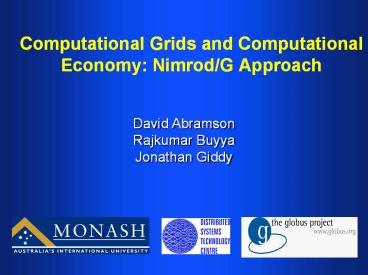Computational Grids and Computational Economy: Nimrod/G Approach - PowerPoint PPT Presentation
Title:
Computational Grids and Computational Economy: Nimrod/G Approach
Description:
Job 11. Job 12. Job 13. Job 14. Job 15. Job 16. Job 17. Job 18. Description. of Parameters ... Engine. Scheduling Algorithm. Find a set of machines (MDS search) ... – PowerPoint PPT presentation
Number of Views:24
Avg rating:3.0/5.0
Title: Computational Grids and Computational Economy: Nimrod/G Approach
1
Computational Grids and Computational Economy
Nimrod/G Approach
David Abramson Rajkumar Buyya Jonathan Giddy
2
Parametric Execution of Applications
- Coarse-grained SPMD model
- Execute one application repeatedly for many
combinations of input parameters - Legacy applications add iteration and
distribution without modifying code - New applications remove iteration and
distribution from design - Parametrised modeling experiments
- Require very high levels of performance
- Generate
- Large amounts of work concurrency
- Uncoupled computations
- Tolerate - moderately high latencies
3
Description of Parameters
4
Working with Small Clusters
- Nimrod (1994 - )
- DSTC funded project
- Designed for department level clusters
- Proof of concept
- Clustor (Activetools) (1997 - )
- Commercial version of Nimrod
- Re-engineered
- Features
- Workstation orientation
- Access to idle workstations
- Random allocation policy
- Password security
5
Clustor limitations
- Manual resource location
- static file of machine names
- No resource scheduling
- first come first served
- No cost model
- all machines cost alike
- Single access mechanism
6
Towards Grid Computing.
Source www.globus.org updated
7
Nimrod/G - Nimrod over Globus/Grid
- Wide-Area Network Support
- redesigned architecture
- use of high-performance networks
- Scalable Scheduling
- guaranteed deadline
- use of existing schedulers
- Computational Economy
- I am willing to pay , can you complete the job
by given deadline - trading, bidding, resource reservation...
8
Layered Architecture (Grid Components)
Applications
High-level Services and Tools
GlobusView
Testbed Status
Nimrod/G
DUROC
globusrun
MPI
MPI-IO
CC
Core Services
GRAM
Nexus
Metacomputing Directory Service
Globus Security Interface
Heartbeat Monitor
Gloperf
GASS
Local Services
Condor
MPI
TCP
UDP
LSF
NQE
Easy
Solaris
Irix
AIX
Source www.globus.org
9
Nimrod/G Architecture
Nimrod/G Client
Nimrod/G Client
Nimrod/G Client
Parametric Engine
Schedule Advisor
Resource Discovery
Persistent Info.
Dispatcher
Grid Directory Services
Grid Middleware Services
GUSTO Test Bed
10
Nimrod/G Interactions
- Additional services used implicitly
- GSI (authentication authorization)
- Nexus (communication)
Resource location
MDS server
Scheduler
Resource allocation (local)
Prmtc.. Engine
Queuing System
Job Wrapper
Dispatcher
GRAM server
Root node
Gatekeeper node
Computational node
11
Scheduling Algorithm
- Find a set of machines (MDS search)
- Distribute jobs from root to machines
- Establish job consumption rate for each machine
- For each machine
- Can we meet deadline?
- If not, then return some jobs to root
- If yes, distribute more jobs to resource
- If cannot meet deadline with current resource
- Find additional resources
12
A Nimrod/G Client
13
Sample Applications of Nimrod
- Bioinformatics Protein Modeling
- Sensitivity experiments on smog formation
- Parametric study of Laser detuning
- Combinatorial Optimization Simulated Annealing
- Ecological Modeling Control Strategies for
Cattle Tick - Electronic CAD Field Programmable Gate Arrays
- Computer Graphics Ray Tracing
- High Energy Physics Searching for Rare Events
- Physics Laser-Atom Collisions
- VLSI Design SPICE Simulations
- Radiation Protection and Nuclear Safety
14
Electronic CAD
15
Some early results -
16
(No Transcript)
17
Related Works
- AppLeS (UC. San Diego)
- application level scheduling case-by-case
- NetSolve (UTK/ORNL)
- API for creating farms
- DISCWorld (U. Adelaide)
- remote information access
- Millennium (UC. Berkeley)
- remote execution environment on clusters and
supports computational economy
18
Conclusions
- Nimrod/G architecture offers a scalable model
for resource management and scheduling on
computational grids - Supports Computational Economy
- The current model supporting Parametric
Computing can be extended to support parallel
jobs or any other computational model. - Plan to use the concept of Advance Resource
Reservation in order to offer the feature wherein
the user can say I am willing to pay , can you
complete my job by this time - Further Information www.csse.monash.edu.au/david
a/nimrod.html
















![The Gridbus Toolkit for Service-Oriented [Cluster/Grid] Computing PowerPoint PPT Presentation](https://s3.amazonaws.com/images.powershow.com/P1246211285tuLYR.th0.jpg?_=19691231070)














